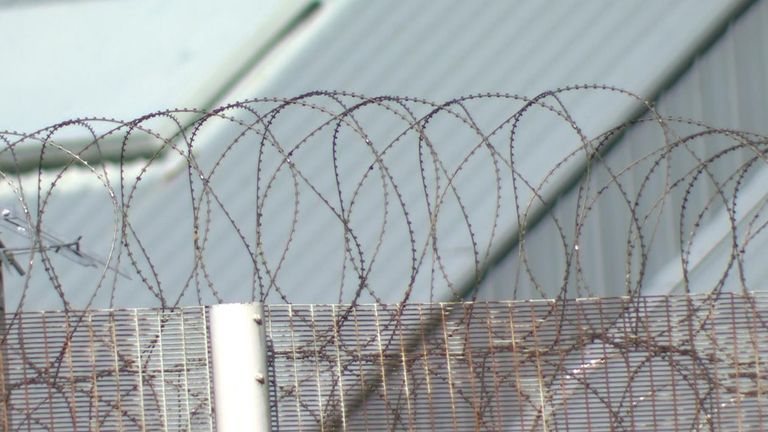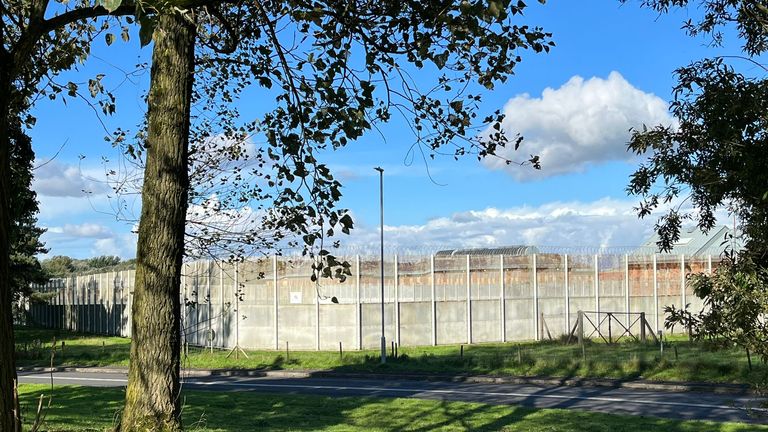“`html
Families have advocated for an investigation into the mental health services available for offenders trapped in indefinite prison sentences – asserting it could “preserve lives”.
Relatives of individuals still enduring a now-abrogated open-ended incarceration term, referred to as imprisonment for public protection (IPP), contend that resources are so “depleted” that the remaining inmates now confront “perpetual mental health challenges”.
They have reached out to parliament’s Justice Select Committee, urging it to initiate an investigation now that a new government is in power.
In correspondence to the committee, which has been reviewed by Sky News, family members link the decline in their relatives’ mental health directly to the prison sentence that lacks a release date and has been characterized as a form of “psychological torture” by human rights advocates.
Clara White, whose sibling Thomas White has spent 12 and a half years incarcerated for the theft of a mobile device, conveyed to the committee members – which is yet to be officially established post-general election – that her brother now grapples with psychosis as a consequence of the IPP sentence.
“Since 2016, Thomas has been exhibiting religious hallucinations, delusions, and atypical thinking patterns,” she stated.
“The prison atmosphere coupled with his prolonged 12-and-a-half-year confinement is the root cause of Thomas’s current struggle with paranoid schizophrenia.”
“The intention of my correspondence is to inquire whether you would contemplate launching an investigation into mental health services,” she continued.
“I am convinced this action could save lives while in custody.”
What are IPP sentences?
IPP sentences were a category of sentence that courts could impose from 2005 until their discontinuation in 2012.
These sentences were designed for serious violent and sexual offenders who posed a significant threat of grave harm to the public, yet whose offenses did not justify a life sentence.
While the government’s declared purpose was public safety, apprehensions rapidly arose that IPP sentences were being utilized excessively, ensnaring lesser offenders who often ended up serving time significantly beyond their initial sentences.
The coalition government abolished this type of sentence in 2012; however, the reform was not retroactive, leaving nearly 3,000 inmates still imprisoned, including approximately 1,200 who have yet to be released.
As it stands, 90 individuals serving IPP sentences have taken their own lives while incarcerated.
Amid the severe overcrowding crisis overwhelming UK prisons, the Ministry of Justice faces mounting pressure from advocates to contemplate a resentencing initiative for IPP inmates, which could potentially grant them a release date for the first time.
‘IPP has shattered our family’
Cherrie Nichol’s brother, Aaron Graham, was just 26 years old when he was sentenced to a term of two years and 124 days for causing serious bodily harm in 2005. Eighteen years on, he still remains incarcerated.
In her correspondence to the committee, Ms. Nichol expressed that her brother had become a “mere shadow of his former self” and was facing “devastating” mental health issues stemming from his IPP sentence.
“The uncertainty surrounding his future and potential release has tragically crushed him and us as a family,” she conveyed.
Further coverage from Sky News:
PM appoints new chief of staff following Sue Gray’s resignation
In the wake of Gray’s departure, PM and team face significant stabilization task
She argued that she did not believe the prison system had been “adequately prepared to manage the consequences of the abolished IPP,” leaving many individuals “suffering with despair and no clear future amidst a revolving door of professionals who cannot make decisions.”
“As family members and advocates, we are compelled to urge you to recognize the mental health challenges inflicted by the IPP,” she emphasized.
Incarcerated individuals ‘must not be overlooked’
During a recent interview with Sky News, Andy Slaughter, the incoming chair of the Justice Select Committee, cautioned that the remaining IPP prisoners should not be “overlooked” by the government.
The Labour MP for Hammersmith and Chiswick, also a former solicitor, highlighted that it has been over a decade since IPPs were abolished, “yet we still find ourselves in a scenario where more than 1,000 individuals remain imprisoned without release.”
“There is a consensus that this situation is unjust; everyone agrees that a resolution must be found for those currently incarcerated, yet there is apprehension that resentencing might involve dangerous individuals,” he commented.
Mr. Slaughter asserted that a resentencing initiative – which has also been advocated by Bob Neill, the former Conservative chair of the justice committee – “would permit a thorough and professional evaluation of each case.”
“This approach ensures a meticulous and thoughtful solution rather than a hurried fix, which could extend the implementation period to as long as two years.
“Systemic changes such as resentencing must be a governmental decision; these are individuals who have been neglected in prison, and I hope this issue will be prioritized on the agenda.”
A representative from the Ministry of Justice stated: “It was appropriate that IPP sentences were repealed. We are actively working to reduce licence periods for rehabilitated offenders, allowing them the opportunity to move forward with their lives.
“With public safety as the utmost priority, the lord chancellor is collaborating with various organizations and advocacy groups to ensure that suitable measures are implemented to assist those still serving these sentences.”
Individuals feeling emotionally distressed or in crisis can reach out to Samaritans for support at 116 123 or via email at jo@samaritans.org in the UK. In the U.S., please contact the nearest Samaritans branch or call 1 (800) 273-TALK.



